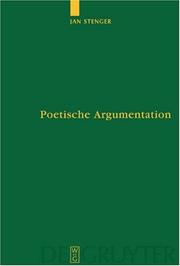| Listing 1 - 2 of 2 |
Sort by
|

ISBN: 3110181274 9786613396839 1283396831 3110204789 9783110204780 9783110181272 Year: 2004 Publisher: Berlin ; New York Walter de Gruyter
Abstract | Keywords | Export | Availability | Bookmark
 Loading...
Loading...Choose an application
- Reference Manager
- EndNote
- RefWorks (Direct export to RefWorks)
Die Gnomai in den Epinikien des griechischen Chorlyrikers Bakchylides haben als vermeintlich konventionelles Beiwerk in der Forschung bislang wenig Interesse gefunden. Im Anschluss an ein zunächst entwickeltes Gattungsmodell des Epinikions weist Stenger in Einzelinterpretationen nach, welch zentrale Bedeutung den Gnomai für die Sinnkonstitution im Siegeslied zukommt. Da die Gnomik im Wesentlichen ethisch-moralische Werte vor einem größeren Publikum vertritt, ordnet er sie in einem zweiten Schritt in den zeitgeschichtlichen Kontext des jeweiligen Liedes ein. Erst diese konsequente Historisierung zeigt, dass Bakchylides seine Gnomai geschickt an die verschiedenen soziopolitischen Gegebenheiten und den Erwartungshorizont seines Auditoriums anpasst. Diese Beobachtungen lassen den Kommunikationsprozess chorlyrischer Dichtung zwischen dem Epinikiendichter, seinem Auftraggeber und dem Publikum in einem neuen Licht erscheinen. The Gnomai in the Epinician Odes and Dithyrambs of Bacchylides have hitherto been regarded as an allegedly conventional accompaniment and thus attracted little attention in research. Following the development of a genre model for the epinicion, individual interpretations demonstrate the central significance of the Gnomai in constituting the sense of the Epinicion. As the gnome essentially represents ethical and moral values to a large audience, a second stage of the study relates it to the contemporary historical context of the relevant text. It takes this rigorous contextualisation to show how Bacchylides skilfully fits his Gnomai to the various socio-political factors and the expectations of his audience. These observations cast new light on the communication process in lyrical choral poetry between the composer of the epinicion, his patron and the public.
Gnomic poetry, Greek --- Bacchylides --- Greek gnomic poetry --- Bacchylide --- Bakchylides --- Bakchulides --- Epinikia --- Poésie gnomique grecque --- Greek poetry --- History and criticism. --- Criticism and interpretation. --- History and criticism --- Spreuken --- Histoire et critique --- Criticism and interpretation --- Gnomic poetry [Greek ] --- Vakchylidēs --- Bacchilide --- Bακχυλíδης
Book
ISBN: 9783161536571 3161536576 3161564294 9783161564291 Year: 2015 Publisher: Mohr Siebeck
Abstract | Keywords | Export | Availability | Bookmark
 Loading...
Loading...Choose an application
- Reference Manager
- EndNote
- RefWorks (Direct export to RefWorks)
Die dem Philosophen Sextus zugeschriebenen Sprüche stellen ein bemerkenswertes Beispiel für eine christlich überarbeitete Spruchsammlung der Kaiserzeit dar. Sie haben pythagoreische Vorläufer und wirken über Evagrius Ponticus im christlichen Mönchtum fort. Der Band zeichnet diese Entwicklungslinien nach.
Christian life --- Gnomic poetry, Greek. --- Cleitarchus. --- Evagrius, --- Pythagoras. --- Sextus, --- Criticism, Textual. --- Sentences of Sextus. --- Religion --- Religion, Primitive --- Atheism --- Irreligion --- Religions --- Theology --- Clitarchus --- Evagrius Ponticus --- Pythagoreer --- Sentenzen --- Studienliteratur --- Editionen, Textausgaben --- Lehrbücher --- Antike --- Alte Geschichte --- Religionsphilosophie --- Antike Philosophie --- Sextos, --- Sixtus, --- Xystus, --- Dicta selecta Sancti Xysti Episcopi Romani --- Sentences of Sixtus --- Sentences of Xystus --- Sexti Pythagorici sententiae --- Sextou gnōmai
| Listing 1 - 2 of 2 |
Sort by
|

 Search
Search Feedback
Feedback About UniCat
About UniCat  Help
Help News
News